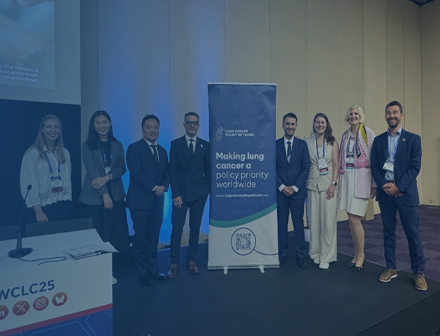In September 2024, the Lung Cancer Policy Network and the Asia Pacific Coalition against Lung Cancer hosted the webinar Lung cancer screening in Asia Pacific: showcasing advances in implementation across the region.
Using the six domains from the Network’s lung cancer screening implementation framework, the event explored the status of screening programmes in the region, and looked at common challenges and key lessons.
The webinar also laid the foundation for an in-person workshop that will take place at the Asia Conference on Lung Cancer.
Kicking off the webinar, Dr Herbert Loong of The Chinese University of Hong Kong spoke about the huge burden of lung cancer in Asia. He called attention to the increasing number of lung cancer screening programmes globally, and said he hoped that countries in the Asia-Pacific region could learn from what has been achieved to develop programmes of their own. He emphasised that these programmes should consider the differences in lung cancer in Asia compared with Western countries. In the region, the epidemiology and risk profile of lung cancer look different from those used in the Nelson and NLST trials. (Find out more about eligibility criteria in Asia here.)
Next, Network Secretariat representative Eleanor Wheeler presented an overview of the Network’s implementation framework, a tool designed to support people who are setting up screening programmes. She discussed other resources in the Network’s online toolkit, which helps users consider whether health systems are ready to set up and develop screening programmes.
Ms Katrina Anderson of Cancer Australia discussed the country’s path to a national lung cancer screening programme, which included an enquiry and feasibility assessment. She also outlined the work currently underway to design and implement the programme, including:
- the co-design of the programme by Cancer Australia, the Department of Health and Aged Care, and the National Aboriginal Community Controlled Health Organisation to ensure that it is equitable, accessible and culturally appropriate
- the inclusion of mobile screening and travel support services to enable equitable access in rural and remote communities
- the use of educational materials and resources to support healthcare professionals and participants
- the expansion of the National Cancer Screening Register to include the lung cancer screening programme
- the development of a national communication strategy to promote the programme, including tailored communications and community-led activities for priority groups such as Aboriginal and Torres Strait Islander peoples.
In sharing some of the key lessons, Ms Anderson stated that the evidence provided by the feasibility study and stakeholder consultation such as a public consultation, as well as the support of the Medical Service Advisory Committee, were essential to getting the programme underway.
Dr Yeon Wook Kim of Seoul National University Bundang Hospital gave an overview of lung cancer screening in South Korea. The journey started in 2015 with a joint recommendation for lung cancer screening from professional societies; this was followed by a government-funded feasibility study (2017–18) that ultimately allowed a national programme to be developed in 2019. Dr Kim emphasised that lung cancer screening was added to the existing National Cancer Screening Program, which made the implementation process easier. Since its inception, the programme has seen an increase in screening uptake year on year; this is due to targeted communication campaigns that highlight the benefits of screening.
Dr Gillianne Lai of the National Cancer Centre Singapore (NCCS) pointed out that there is no national screening programme for lung cancer in the country, and that many people there pay for screening low-dose computed tomography (LDCT) scans out of pocket. She went on to discuss a feasibility study developed by NCCS that includes a smoking cohort and a non-smoking cohort focused on family history. In 2023 and 2024, approximately 1,000 people signed up to take part in the study, with about 45% eligible. Despite a multi-pronged recruitment strategy and engagement with primary care professionals, only 5% of the sign-ups came from the primary care setting. Looking forward, if a national screening programme is to be developed, Dr Lai said she believed that primary care should be involved in the planning process for better identification of eligible individuals. She emphasised that a coordinated effort is crucial for the broader uptake and scalability of lung cancer screening.
Dr Sewanti Limaye of Sir HN Reliance Foundation Hospital and Research Centre in Mumbai noted that India is at the beginning of its journey towards lung cancer screening. While some private healthcare providers offer it, screening in general is limited. Dr Limaye said that high cost, low awareness, insufficient workforce capacity and the limited number of screening centres are some of the barriers to screening; she then gave an overview of the Comprehensive Cancer Prevention, Screening and Management Program of the Precision Oncology Center, which includes screening for lung cancer. In 2023 and 2024, the programme identified almost 2,000 people at high risk of lung cancer; over 400 were screened and seven were identified as having early-stage lung cancer. When discussing some of the challenges to screening implementation, Dr Limaye spoke of the need for healthcare professionals to understand those at high risk of lung cancer, beyond smokers, and the use of biomarker identification to ensure the most effective use of resources. She concluded her presentation by saying, ‘We have to be lung aware, breath aware and screen aware’ – and that she welcomed a joint effort and community awareness to help drive screening in India.
Thank you to those who joined us, and a particular thanks to our wonderful speakers!
Recent news
Blog

Insights from WCLC 2025
At the World Conference on Lung Cancer in Barcelona, the Network hosted a very well-attended panel discussion focusing on the latest developments in lung cancer policy.
Case study

The screening programme for lung cancer in the Canadian province of British Columbia
We explore how a regional screening programme has been established throughout British Columbia.
News

Event to address lung cancer screening implementation in Central and Eastern Europe
On 16 September, the Network and the Croatian National Lung Cancer Screening Program will be hosting an in-person event.
